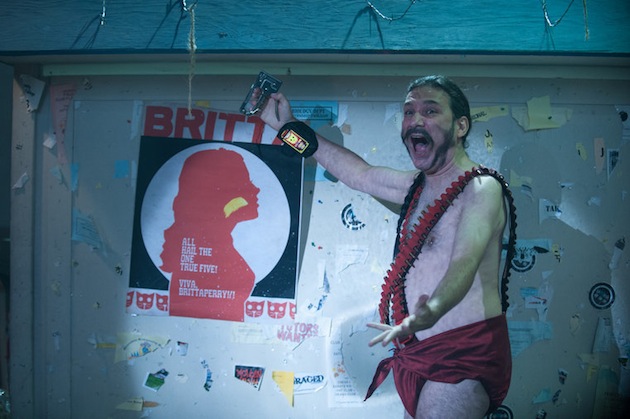Community Season 5, Episode 8 “App Development and Condiments”
Written by Jordan Blum & Parker Deay
Directed by Rob Schrab
Airs Thursday nights at 8pm ET on NBC
Community‘s never been a show known for its social critiques – except for the innate ugliness of humans, the constant cycle of reconciliation and relapse, the feeling that everything in life is two steps backward, then one step forward. And that idea is embedded somewhere in the construct of “App Development and Condiments”, where MeowMeowBeenz become the defining factor of a society, the Community equivalent of a retweet/Facebook like/other social network sign of recognition giving way to a dystopian society inside the cultural (and given the presence of Leonard, generational) melting pot of Greendale Community College.
There are certainly moments of “App Development and Condiments” that reaches for something more than a reason to transform the campus and squeeze a number of guest stars (headlined by Mitch Hurwitz and Tim Heidecker), particularly with Britta’s mustard subplot. Most of “App Development” is about the loss of individuality in a society absorbed by websites: the caste system of one through five’s eventually led to an absence of color across campus – white at the top, gray at the bottom, and everyone else in the middle various shades of both (like the three’s, who wore a combination of dark blue and gray). Social networks, by design, are purported to bring the world ‘together’, to unify us in our oneness: but when we’re reduced to a string of likes, favorites, and five MeowMeowBeanz, it turns into a race to conformity (exemplified by Jeff’s five-star “Apple” speech, which won over the crowd and earned him his entry into the Five MeowMeowBeanz club).
Britta’s streak of mustard is not just a hilarious joke – eventually, it is what separates her from the rest of the ones, the quality that deems her important enough to pay attention to. But like those MeowMeowBeenz ratings, that mustard means nothing; it’s an empty symbol (one that turns political, given her beret and propaganda signs) that only gains meaning through social acceptance, turning her into the ‘leader’ of the Ones. Which, Jeff later reminds us, is the leader of a fake faction, playing a fake game, at their college campus… on a Saturday. It’s all meaningless; instead of being in the world, living life, they dedicated countless hours in pursuit of something so facsimile, something so easily erased (with a simple tap on the trash icon – or a napkin, in Britta’s case) and forgotten.
However, the episode focuses more on the Shirley/Jeff dynamic, a much less rewarding (and revealing) story that doesn’t hold much significance outside the episode. Yes, Jeff and Shirley both like to be in control – these are well-established traits that have clashed heads before, with better results (re: anime foosball match). Their cathartic, character-based story line doesn’t fit in with the rest of the episode; on top of the homages to dystopian fiction, the MeowMeowBeenz stuff, and the examination of the effects of social media, there just wasn’t enough room to establish the kind of dramatic stakes it would take to make their conversation in the Outlands pay off emotionally. Sure, it’s nice to see Jeff admit that he didn’t invite Shirley because he thought she would be busy… but that’s all there is to it, a simple resolution to a petty drama solved ten minutes after its introduced (almost as quick as The Purge Of About Two Minutes Ago). It’s just not interesting – and when “App Development” pulls back on everything else to focus on their beef, it becomes a much less interesting episode.
At worst, “App Development and Condiments” is an ambitious episode trying to juggle too much: it leaves everything feeling slightly glossed over, the most intriguing parts happening in the margins of the episode’s focus (like Britta, or Abed’s glee at something that made him easily socially acceptable; “I fit in,” he tells Jeff excitedly after joining the ones). When it does pause for those small asides, it reveals a more contemplative approach to the dystopia it portrays – unfortunately, Community is only 22 minutes long, which doesn’t really give a lot of time to pause and reflect when juggling so many ideas. Not a bad episode, but one that doesn’t quite follow through with its ideas – an odd turn, given that it’s often the show’s strength.
— Randy


